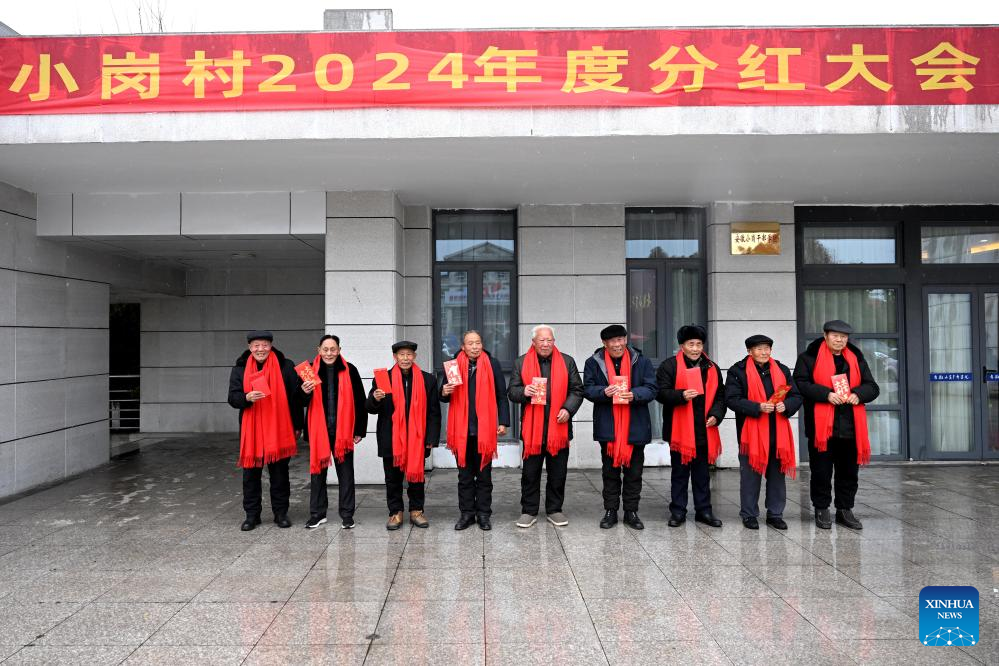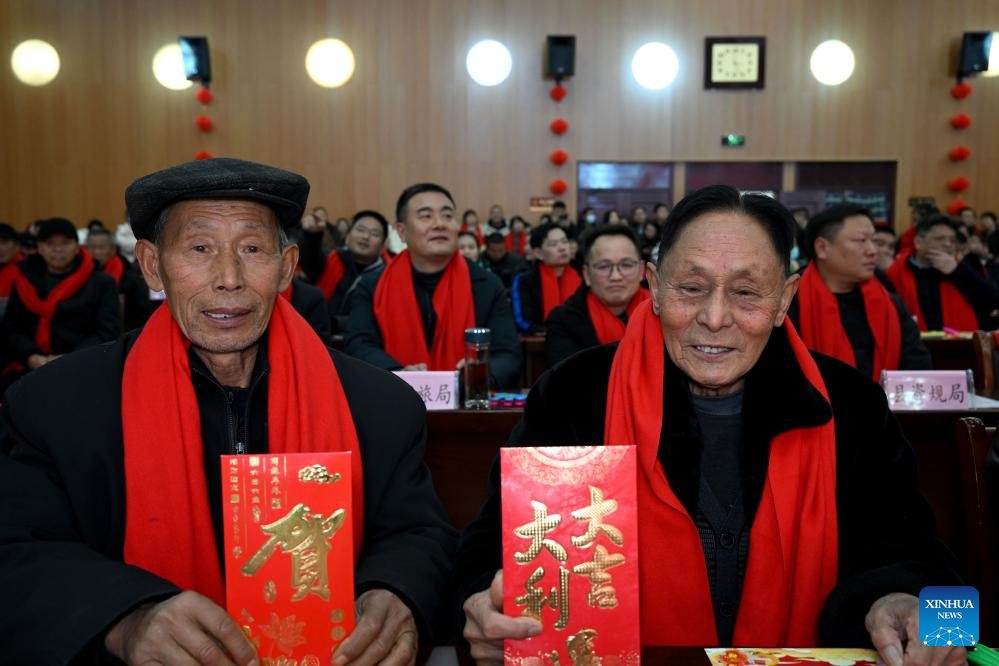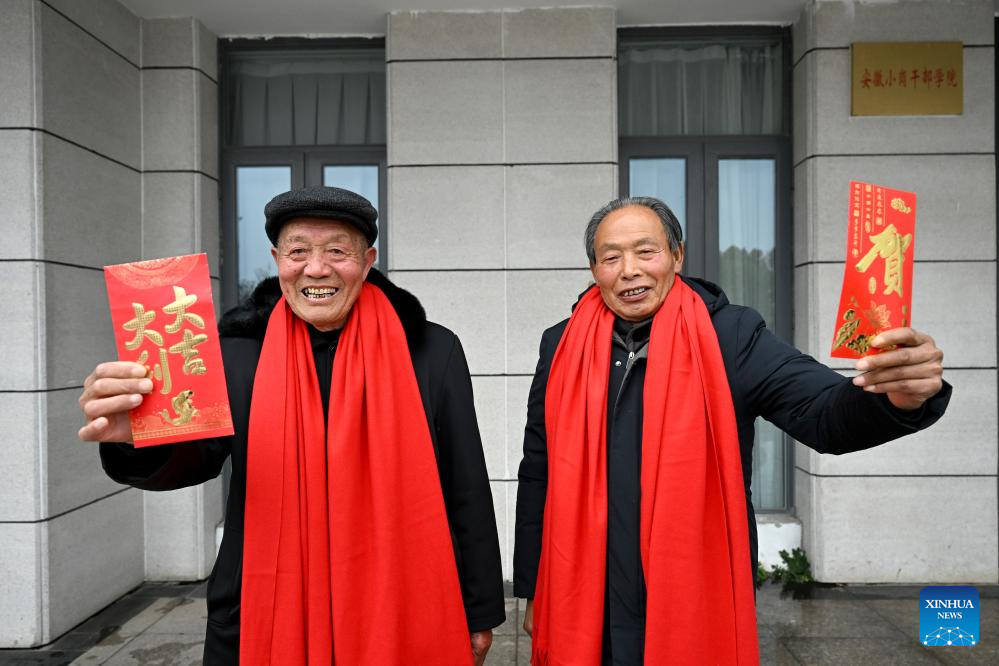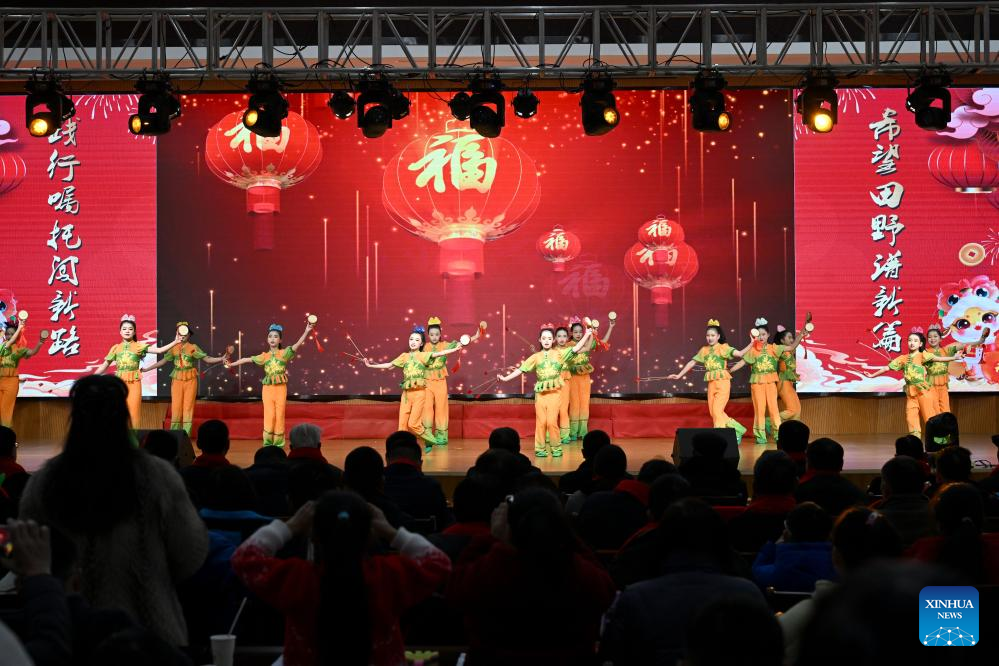
Villagers show the red packets containing their dividends in Xiaogang Village of Fengyang County, east China's Anhui Province, Jan. 25, 2025. Once plagued by barren land and water scarcity, Xiaogang was a place where residents struggled to make ends meet. However, everything changed in 1978 when 18 farmers pressed their red fingerprints secretly on an agreement to contract collective land to individual households. This bold move sparked a wave of agricultural production enthusiasm and provided a powerful impetus not only for Xiaogang, but also for the broader rural reform and revitalization movement in China. In 2024, Xiaogang saw its dividends rise for the seventh consecutive year, with a major contributor to this success being the village's booming tourism industry. This momentum was further boosted when Xiaogang was honored as one of the world's Best Tourism Villages at a United Nations Tourism meeting last year.(Xinhua/Huang Bohan)
HEFEI, Jan. 25 (Xinhua) -- Just days ahead of the upcoming Spring Festival, residents of a rural village named Xiaogang, located in east China's Anhui Province, met joyously to collect bumper red packets.
"Our family received more than 2,000 yuan (about 279 U.S. dollars) this year, which is enough for us to make a generous purchase of festive goods," said 82-year-old villager Yan Jinchang.
A dividend distribution ceremony was held on Saturday, and buzzed with excitement. Contrary to the common perception that villages are predominantly inhabited by elderly people, there were numerous young and energetic faces to been seen at this ceremony -- with many of them returnees filled with dreams.
Some of the youngsters shared Xiaogang's stories with visitors, while others functioned as live streamers, highlighting the village's unique appeal via their camera lenses.
Despite the modest amount, the dividends distributed in Xiaogang hold extraordinary significance in terms of the big picture of the development of rural China.
Once plagued by barren land and water scarcity, Xiaogang was a place where residents struggled to make ends meet. However, everything changed in 1978 when 18 farmers pressed their red fingerprints secretly on an agreement to contract collective land to individual households.
This bold move sparked a wave of agricultural production enthusiasm and provided a powerful impetus not only for Xiaogang, but also for the broader rural reform and revitalization movement in China.
The name of Xiaogang has since been fixed in the nation's memory as the start of China's reform, earning itself the title of "first village in rural reform."
Building on this foundation, Xiaogang continued to introduce reforms across multiple sectors -- including rural taxes and fees, land rights and collective assets.
In 2017, all villagers in Xiaogang were turned into shareholders of the village's collective, to benefit from the business development from Xiaogang's intangible assets. So far, the total amount of dividends given to villagers in Xiaogang has exceeded 20 million yuan.
In 2024, Xiaogang saw its dividends rise for the seventh consecutive year, with a major contributor to this success being the village's booming tourism industry. This momentum was further boosted when Xiaogang was honored as one of the world's Best Tourism Villages at a United Nations Tourism meeting last year.
This recognition has served as a catalyst, drawing widespread attention and boosting Xiaogang's appeal as a tourist destination. The village, home to 1,053 households, welcomed over 620,000 visitors in 2024 -- generating comprehensive tourism revenue of approximately 165 million yuan.
According to Li Jinzhu, the first secretary of the village's Party committee, tourism has now become a magnet attracting wealth and talents.
"Very few tourists were willing to visit Xiaogang in the past, but now we provide them with quality accommodation and catering services, as well as a rich variety of activities, including traditional local performances and children's amusement facilities," Li noted, while adding that many villagers are currently engaged in the tourism sector, with more young people returning to the village to pursue opportunities there.
Yan Mei is one of these passionate young returnees.
The 28-year-old guide works almost every day and is the first to step from the sightseeing vehicle and introduce the history of Xiaogang to visitors.
"People are just blown away by the modern hotels and brand-new scenic spot facilities here. They're so happy to see how much the birthplace of China's rural reform has changed," Yan noted.
Some tourists even decide to stay for a few days, just to chat and hang out with the locals, with many ending up becoming friends with the villagers, and even waving hello and exchanging gifts on holidays. "I'm really proud of all these changes. All these things have made my job so much more meaningful," Yan said.
At a main road, Yang Wei and his colleagues were seen shooting footage for the village's social media account, with their efforts drawing the attention of a group of curious tourists.
"It's a great sign that Xiaogang is gaining more fame. This growing recognition benefits every villager. We've been using social media not just to attract visitors, but also to promote our local agricultural products. We're thrilled to see it working," Yang said while doing a live broadcast. He noted that in 2024, his team had managed to sell products worth more than 1.2 million yuan.
As the sun set over Xiaogang, lively chatter between villagers and tourists mingled with the inviting aroma of freshly brewed coffee, generated by a newly-built cafe. It is a scene brimming with potential -- suggesting a bright future filled with prosperity and endless opportunities for this remarkable Chinese village. ■

Villagers Yan Fuchang (L) and Yan Xuechang show the red packets containing their dividends in Xiaogang Village of Fengyang County, east China's Anhui Province, Jan. 25, 2025. Once plagued by barren land and water scarcity, Xiaogang was a place where residents struggled to make ends meet. However, everything changed in 1978 when 18 farmers pressed their red fingerprints secretly on an agreement to contract collective land to individual households.
This bold move sparked a wave of agricultural production enthusiasm and provided a powerful impetus not only for Xiaogang, but also for the broader rural reform and revitalization movement in China.
In 2024, Xiaogang saw its dividends rise for the seventh consecutive year, with a major contributor to this success being the village's booming tourism industry. This momentum was further boosted when Xiaogang was honored as one of the world's Best Tourism Villages at a United Nations Tourism meeting last year.(Xinhua/Huang Bohan)

Villagers Yan Jinchang (L) and Yan Hongchang show the red packets containing their dividends in Xiaogang Village of Fengyang County, east China's Anhui Province, Jan. 25, 2025. Once plagued by barren land and water scarcity, Xiaogang was a place where residents struggled to make ends meet. However, everything changed in 1978 when 18 farmers pressed their red fingerprints secretly on an agreement to contract collective land to individual households.
This bold move sparked a wave of agricultural production enthusiasm and provided a powerful impetus not only for Xiaogang, but also for the broader rural reform and revitalization movement in China.
In 2024, Xiaogang saw its dividends rise for the seventh consecutive year, with a major contributor to this success being the village's booming tourism industry. This momentum was further boosted when Xiaogang was honored as one of the world's Best Tourism Villages at a United Nations Tourism meeting last year.(Xinhua/Huang Bohan)

A performance is staged at a dividend distribution ceremony in Xiaogang Village of Fengyang County, east China's Anhui Province, Jan. 25, 2025. Once plagued by barren land and water scarcity, Xiaogang was a place where residents struggled to make ends meet. However, everything changed in 1978 when 18 farmers pressed their red fingerprints secretly on an agreement to contract collective land to individual households.
This bold move sparked a wave of agricultural production enthusiasm and provided a powerful impetus not only for Xiaogang, but also for the broader rural reform and revitalization movement in China.
In 2024, Xiaogang saw its dividends rise for the seventh consecutive year, with a major contributor to this success being the village's booming tourism industry. This momentum was further boosted when Xiaogang was honored as one of the world's Best Tourism Villages at a United Nations Tourism meeting last year.(Xinhua/Huang Bohan)



